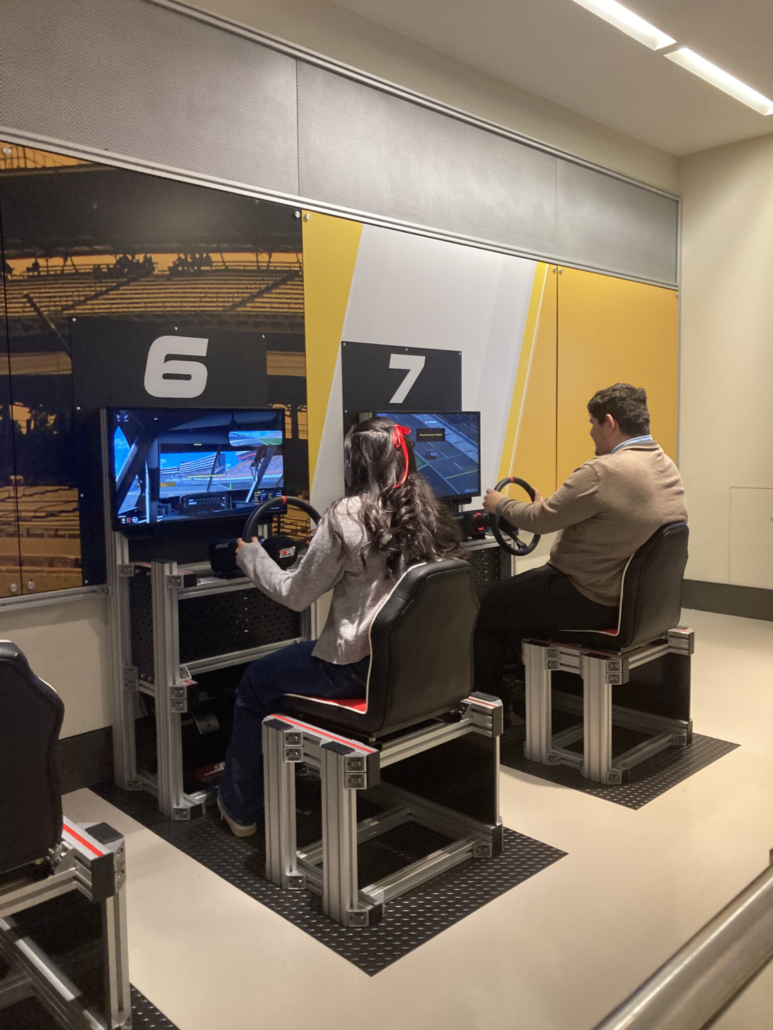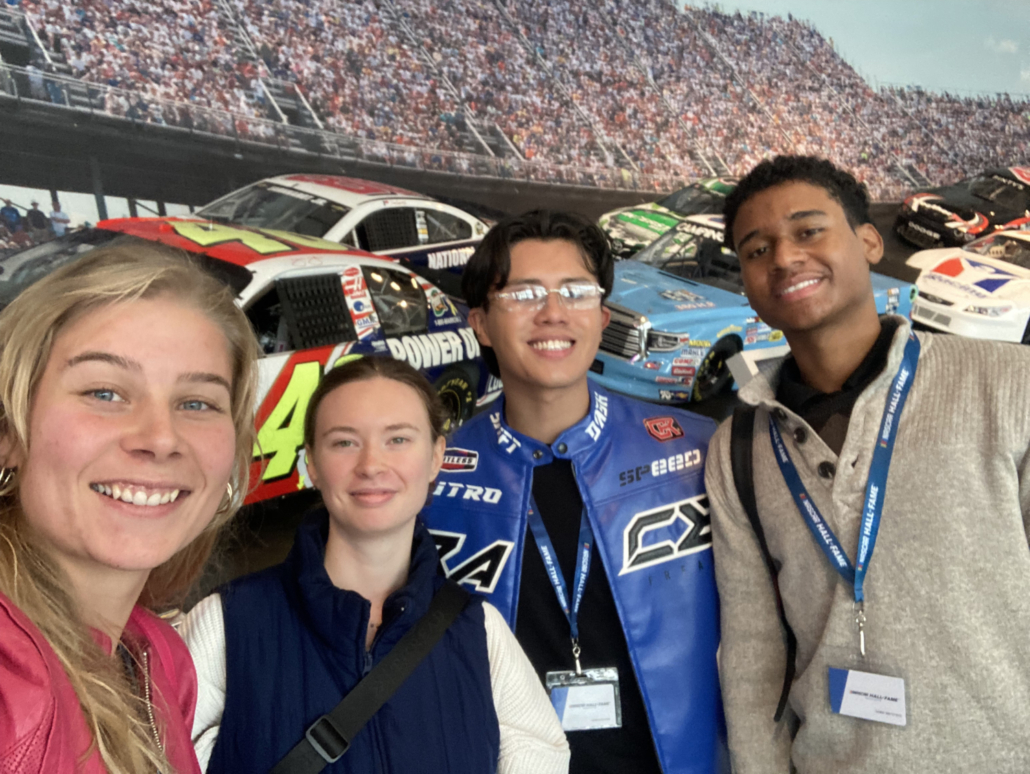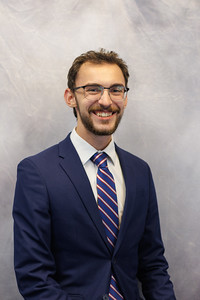Field Trip: NASCAR Hall of Fame
/in LivingEd - Activities, LivingEd - CharlotteAuthor: Katelyn Wissinger| Student, Living Education – Charlotte, 2025-26
On December 7, the Living Education students toured the NASCAR Hall of Fame museum in Charlotte, NC, where they learned more about racing cars and enjoyed time together. The exhibits they walked through explained the history of the National Association for Stock Car Auto Racing from its inception to its current state. Life-sized models of the cars and samples of the track surfaces were on display. A racing simulator and pit stop simulator provided an opportunity for friendly competition, as the students got a feel for what stock car racing involves. All the attendees came back from the trip having learned something and made new memories.







Dr. Richard Franz: Self Control – Don’t Give it Away
/in LivingEd - CharlotteAuthor: David Markopoulos | Living Education
These posts summarize the forums that our Living Education-Charlotte students attend each week.
Dr. Richard Franz, a pastor serving in the Midwest, took the time to address the Living Education-Charlotte students in a recent forum.
Choices We Make
Dr. Franz began by highlighting the importance of choices in our lives. It is very easy for choices we make repeatedly to become habits. That’s why it’s important for us to ensure we are choosing what God would want us to choose. One major mark of our conversion is the degree to which we are able to make informed decisions based on what God would choose. Furthermore, it’s important to realize the impact our choices have on others. What will be the legacy of your choices?
Importance of Self Control
Proverbs 4:26 states: “Ponder the path of your feet, and let all your ways be established.” This is an important reminder to be mindful of the choices we make in life. Having the discipline to make right, wise, and godly choices involves a great deal of self control.
Dr. Franz pointed out that it is the discipline of self control that enables us to benefit from God’s—and others’—wisdom, instruction, and correction. While we may want to do the right thing, it sometimes comes at the cost of other things we may want. It’s easy to hold on to our human nature, get angry, become depressed, or try to justify ourselves. It can be especially hard when others seem to be actively working against us. Even when it’s unintentional, it’s easy for us to let go of our self control and become reactive to the things people do and say—but a strong sense of self control helps us gain a handle on those impulses and make the right choices.
Choose Right
Dr. Franz pointed out the example in John 5:6 where Jesus asked a paralytic an important question: “Do you want to be made well?” So much hinges on our desire and willingness to put aside our human nature and choose to do the right thing. It involves the discipline, integrity, and self control to guard our hearts with all diligence, and strive to do the godly thing in spite of everything else.
Dr. Franz encouraged the students to reject ungodly attitudes, and to always choose right, choose to forgive, choose to give the benefit of the doubt, and to choose to live with purpose and direction. We can choose to have an internal battle, or we can choose to live proactively with the help of God’s Spirit, maintaining self control and developing strong character every day.

David Markopoulos is a Living Education alumnus from the 2023-2025 school years. Originally hailing from Chicago, he currently works for the Living Education program.
Mr. John Robinson: Being the Managing Editor
/in LivingEd - CharlotteAuthor: David Markopoulos | Living Education
These posts summarize the forums that our Living Education-Charlotte students attend each week.
Mr. John Robinson is the Managing Editor for the Living Church of God. In a recent forum message to the Living Education-Charlotte students, Mr. Robinson shared some of his experiences working in the print media industry, as well as some aspects of the Managing Editor’s job.
Experiences Are For a Reason
Mr. Robinson has a long background in print and publishing. He related to the students that many of the experiences, skills, and knowledge he gained as part of this career were not always directly applicable to his then-job. As time went on, he wondered why he would have certain experiences in life. It was 12 years ago that the job offer was posted for the Managing Editor for the Church—and the description matched him perfectly.
Since then, it became clear to Mr. Robinson that the experiences he was given earlier in life were meant to suit him in the role God gave him later. This was an important lesson Mr. Robinson stressed to the students—while you may not always understand why you’re experiencing something, God is working out all things for good (Romans 8:28). The experiences and skills you gain now may come into play later on in ways you never imagined.
Principles of Design
One major aspect of Mr. Robinson’s job involves design. In his words, design is organizing information. This goes further than organizing visual elements in an aesthetic way, but also includes assessing the purpose of the design, accounting for every detail that goes into the creative process, and eliminating mental clutter.
One challenge designers face is the fact that the human brain is always looking for a reason to stop reading. As a result, the layout process for the Church’s print media must be completed with care and deliberate intent. Mr. Robinson spoke in detail about the intentionality behind the design elements the Church uses. Everything—the fonts used, the sizes, the colors, even the amount of words in a line—serves a purpose, and is designed to make the reading experience as easy on the reader as possible, while also retaining the core intent of the original author’s vision. Mr. Robinson is a large part of this process, overseeing the layout, versioning, and editing of print media, from the Tomorrow’s World/Living Church News magazines to the booklets.
Design in Your Life
Mr. Robinson’s previous career in print and publishing led him to be a qualified and valuable asset to the editorial process in the Church. Just as the experiences that helped him reach that point did not always make sense, sometimes the things we experience in our day-to-day lives do not always make sense until later. The lessons we learn, skills we gain, and experiences we have may become relevant later on, and we must always have faith in God that He will be able to use those experiences for His benefit, in His timing—and it may mean you end up somewhere you never expected. Mr. Robinson stressed to the students that God is actively involved in all our lives, and is tailoring a life experience unique to all of us.

David Markopoulos is a Living Education alumnus from the 2023-2025 school years. Originally hailing from Chicago, he currently works for the Living Education program.
Dr. Roedolph Opperman: God’s Awesome Universe
/in LivingEd - CharlotteAuthor: David Markopoulos | Living Education
These posts summarize the forums that our Living Education-Charlotte students attend each week.
Dr. Roedolph Opperman is a lead systems engineer with a bachelor’s degree in Mechanical Engineering and advanced degrees in Aerospace Engineering from MIT. He has worked on the Mars 2020 Perseverance Rover with NASA, and has a great deal of experience in the engineering field. In a recent forum to the Living Education-Charlotte students, Dr. Opperman talked about space travel and the beauty of God’s creation.
t
H
To the Moon
Throughout history, 12 men have had the distinction of walking on the moon. Dr. Opperman mentioned that NASA has been planning to send people back to the moon – a notable feat of human achievement. However, it is important to keep in mind that sending humans to space is dangerous, difficult, and expensive. For the past several years, NASA’s space exploration work has occurred through the work of several smaller companies receiving funding.
Dr. Opperman worked as a fault protection engineer on the Perseverance Rover, and described his job as helping to minimize issues. The rover had to be tested repeatedly to ensure it would function properly and to account for every situation. Anyone working on the rover had to wear protective suits so as to prevent anything from going into space that wasn’t supposed to – no human DNA was supposed to travel along with the rover.
The Future
Dr. Opperman also addressed Elon Musk’s ongoing endeavors to colonize Mars. Recent rocket launches and testing of SpaceX’s propulsion systems are leading to further advancements in this area, and it is Musk’s hope to begin colonizing the stars before long.
However, Dr. Opperman pointed out that human beings are not designed for space travel. Astronauts have to undergo physical training to be prepared to enter space, and are trained for the zero-gravity environment by floating in water tanks. Space travel takes a physical toll on the human body and immune system, and the strain it causes shows how underprepared we are as a species to begin taking on the cosmos.
We can look forward to the time when our physical forms are changed into spirit, and we have the opportunity as God’s begotten children to experience creation from His perspective when that change occurs. When Jesus returns and creation is liberated, we will be able to explore the beauty of the stars without the limitations of our current technology or the dangers that threaten our physical bodies. We will have the chance to appreciate and experience the beauty of creation in a way we never have before.

David Markopoulos is a Living Education alumnus from the 2023-2025 school years. Originally hailing from Chicago, he currently works for the Living Education program.
Mr. Gerald Weston: Opportunities and Regrets
/in LivingEd - CharlotteAuthor: David Markopoulos | Living Education
These posts summarize the forums that our Living Education-Charlotte students attend each week.
Mr. Gerald Weston, the Presiding Evangelist of the Living Church of God, took the time to address the Living Education students about important life principles, pulling from his own experiences. In life, we all have opportunities and regrets, and it’s important to have a well-balanced perspective on the lessons life teaches us.
My Way
Mr. Weston referenced My Way, a famous song by Frank Sinatra. The attitude in this song is far too easy to fall into at times, and Mr. Weston reminded the students that doing things our way doesn’t always lead to positive outcomes. Instead, we should keep in mind that as we write our life story, it is ultimately God’s way that we should be following.
Early Days
Mr. Weston related some stories from his early days. Growing up in a military family from California, he found himself moving very often. From Sacramento to Utah to Alaska to England, the Westons frequently moved around.
In those days, young people coming up lived under the shadow of the bomb. The threat of nuclear war—and the onset of the Cold War itself—were sobering pressures on society that affected many young people as they entered adulthood. Similarly, each generation has unique and difficult challenges that affect them as they enter maturity.
Mr. Weston fondly related his days playing Little League baseball, and football in junior high. Baseball, football, swimming, and physical fitness were important to Mr. Weston as he grew up, and the lessons he learned from them helped frame his outlook for the rest of his life.
Value of Experience
Mr. Weston mentioned that we often don’t realize how the things we experience and learn will come into play later in life. Recognizing how our experiences have affected us and how they will become useful later on is an important skill. For example, Mr. Weston mentioned that in his youth he enjoyed fishing as a hobby—but it became a helpful skill in pastoring to better relate to and spend meaningful time with members.
Experiences and Opportunities
We all have unique experiences and opportunities in life, and Mr. Weston encouraged the students to develop positive habits now that can become useful later in life. Take the opportunities life offers, and while rejection may come, don’t let it get you down. Learn from the experiences that you have and become a positive force for good in the world. Just like the LivingEd-Charlotte students’ parents have invested in their ability to come to Headquarters to study, God is investing in all of us through the opportunities He gives us. It’s important for us to make the most of those opportunities and prove a valuable investment to God.

David Markopoulos is a Living Education alumnus from the 2023-2025 school years. Originally hailing from Chicago, he currently works for the Living Education program.
Mr. Lawdi Ferreira: Emotional Maturity and Resilience
/in LivingEd - CharlotteAuthor: David Markopoulos | Living Education
These posts summarize the forums that our Living Education-Charlotte students attend each week.
Mr. Lawdi Ferreira is a pastor serving the Church in South Africa. In a recent forum, he began by asking the Living Education students a question: “How mature are you?”
Just like an intelligence quotient—our IQ—we also have an EQ: our emotional intelligence. As we grow from childhood to adulthood, not only do we grow physically, but we must learn to grow in mental, spiritual, and emotional maturity. Mr. Ferreira pointed out that since God has given us the capacity for a wide range of emotions, He also intends for us to regulate those emotions and develop maturity. Those who embody emotional maturity are able to be resilient in the face of life’s challenges. Learning these skills is essential as we strive toward our future in the Kingdom of God. Mr. Ferreira gave important points to consider and steps to develop emotional maturity and resilience.
What is Emotional Intelligence?
The Oxford Dictionary defines “emotional intelligence” as: “The capacity to be aware of, control, and express one’s emotions, and to handle interpersonal relationships sensibly and kindly.” Not only does emotional intelligence involve managing our own emotions, it also means recognizing and relating to the emotions of others. This is an important skill that can be developed over time with consistent effort.
Mr. Ferreira clarified an important distinction: emotional intelligence can be described as the skill of being able to identify, understand, and manage emotions; by contrast, emotional maturity is the result of exercising emotional intelligence. It is how you live and behave as a result of exercising these skills.
Resilience
Related to emotional intelligence is the trait of resilience. The Oxford Dictionary defines “resilience” as: “The capacity to recover quickly from difficulties, negative and hurtful situations.” Mr. Ferreira compared resilience to a metal spring—a metal spring can undergo intense pressure, but can bounce back to its original shape. As we exercise emotional intelligence in regulating those emotions, we develop the ability to handle difficult and distressing situations without breaking. This means not shying away from challenges, but adapting, facing the pressure, and doing hard things anyway. The lessons we learn from choosing to be resilient in the face of pressure help us develop the character that God is looking for in the Kingdom. Resilience can be compared to a muscle that becomes stronger over time—not by avoiding pain, but working through it.
Do Hard Things
Learning to develop resilience is crucial in our lives. Life will always throw challenges at us, and we have to be prepared. As Jesus’ return comes closer, the difficulties we face will become harder. If we have developed the trait of resilience, we’re choosing to stay strong in the face of adversity.
Life is full of change. Adulthood presents many challenges, uncertainty, and disappointments. Our jobs, finances, families, and friends present many opportunities for uncertainty. James 4:13-15 states: “Come now, you who say, ‘Today or tomorrow we will go to such and such a city, spend a year there, buy and sell, and make a profit’; whereas you do not know what will happen tomorrow. For what is your life? It is even a vapor that appears for a little time and then vanishes away. Instead you ought to say, ‘If the Lord wills, we shall live and do this or that.’” Our plans often change. How will we respond when hardships come our way? We need to recognize our emotions, choose to take control of them, and try our hardest to bounce back in spite of them. This is one of the most important skills we can develop. It isn’t always easy, but can be learned over time.
You Have a Choice
When was the last time you got extremely upset? Something a friend said, a driver on the road, a stressful situation you couldn’t control, or something that someone did to you—these situations happen from time to time. Imagine how you felt in that situation—imagine how you would use the skill of emotional intelligence if you were to experience it over again. We have the choice of being reactionary, complaining, and letting it ruin our day—maybe even our week. But we also have the choice not letting our emotions get the better of us and letting it go. This is actually a principle of showing love to our neighbor by not holding grudges.
In life, we need to learn to counter our human nature—our initial reactions are what get us into trouble. When we face crises, uncertainty, hardships, offenses, and hard days, we have to recognize our emotions for what they are, avoid going to extremes, and learn to roll with the punches. Our spiritual and mental health depend highly on our ability to exercise emotional intelligence when things go wrong. The Fruit of the Spirit in Galatians 5 outlines a picture of the kind of person who embodies this intelligence. When we fall short, we must hold ourselves to the standard of a Christian who maintains control of their emotions.
Be Emotionally Mature!
In life, we need to be checking our EQ. Emotional intelligence arms us with the tools to deal with difficult situations. We can learn to exercise emotional intelligence and grow in maturity, learning to become resilient in the face of life’s challenges. As spiritual babes in Christ, we must learn to have a healthy outlook on life, regulating our reactions and relating with kindness and tact to others. As we develop these traits, we can be cool, calm, and patient when things go wrong.
2 Timothy 1:6-7 states: “Therefore I remind you to stir up the gift of God which is in you through the laying on of my hands. For God has not given us a spirit of fear, but of power and of love and of a sound mind.” God promises that when we fall short, He will pick us up. We don’t have to be emotionally dysregulated, but can tap into the gift of God’s spirit to help us stay spiritually strong. We have a responsibility before God to do our best to develop a healthy outlook on our emotions. The next time life throws you a curveball, remember that you have the tools available with God’s help to develop a strong sense of emotional maturity.

David Markopoulos is a Living Education alumnus from the 2023-2025 school years. Originally hailing from Chicago, he currently works for the Living Education program.
Dr. Scott Winnail: God’s Church in Western Kenya and Uganda
/in LivingEd - CharlotteAuthor: David Markopoulos | Living Education
These posts summarize the forums that our Living Education-Charlotte students attend each week.
Dr. Scott Winnail, a longtime minister, serves as the Assistant Regional Director over the United Kingdom, Europe, the Middle East, and Africa. Although originally from the United States, he currently lives near and serves at the Church’s regional office at Kettering, UK. In his recent forum message, Dr. Winnail gave the students a glimpse into his recent travels to the heart of Africa to visit the Church there.
Tend and Keep the Flock
Jesus told Peter in John 21:15-17 to “feed My lambs,” “tend My sheep,” and “feed My sheep.” The Church of God today has a responsibility to serve and look out for all its members, including those in remote areas. Dr. Winnail led the students on a journey to some of those remote areas, starting in Nairobi, Kenya.
Recounting the history of Kenya, Dr. Winnail remarked that it is the wealthiest nation in east Africa. It was a British colony from 1898 to 1963, and has been a major trade hub in the region for years, exporting coffee and tea. There are over 60 languages spoken in Kenya, including English and Swahili. However, despite its rich history and diversity, Kenya is afflicted by poverty and crime in its major cities. We have faithful members across Kenya who benefit greatly from visits by Dr. Winnail and Regional Director Mr. Peter Nathan.
The Church in Kenya
Dr. Winnail related his visit to the western region of Kenya after the Days of Unleavened Bread, where over 400 members are served by seven deacons, six elders, and three pastors. In Kendu Bay—where the Living Church of God observes the Feast of Tabernacles each year—there are around 30 members. The Feast draws around 250 attendees to this location.
Dr. Winnail mentioned the challenges faced by many members, including frequent imprisonment. Many citizens often face prison time despite being innocent, but God’s hand is still evident in these situations. Dr. Winnail noted that many prisoners are subscribers to Tomorrow’s World, and that the Gospel has been brought even into prisons in remote areas. He also mentioned our camp in Kenya is on average the largest camp that the Church hosts in the world.
Uganda and Back to Kenya
Dr. Winnail also talked about his travels to Uganda, where members face difficulties. These members also benefit greatly from being visited by Dr. Winnail and Mr. Nathan, whose leadership greatly stabilizes the Church in these remote regions. Traveling back to Kenya, a leadership meeting was held for deacons and elders in order to assist and strengthen them in their duties.
Lessons from East Africa
Dr. Winnail described how vast areas of this region are densely populated, and many members face great difficulties. They are dependent on rain, and many have been called to the truth within walking distance of one another. God has blessed and is growing His Church in east Africa, and He calls people everywhere. As the flock in this part of the world continues to grow, we must remember to always pray for our brethren everywhere.

David Markopoulos is a Living Education alumnus from the 2023-2025 school years. Originally hailing from Chicago, he currently works for the Living Education program.
Disc Golf Activity
/in LivingEd - Activities, LivingEd - CharlotteAuthor: Katelyn Wissinger| Student, Living Education – Charlotte, 2025-26
The Living Education students hosted a disc golf activity at the Church picnic on a mild Sunday morning in early November to serve the local Charlotte congregation. Church members who wanted to participate were split into groups and led around the disc golf course by students at the park where the picnic was being held. Both families, young adults and older members, joined in. There were participants of many different skill levels; however, everyone enjoyed themselves, and all were rewarded at the end with homemade chocolate chip cookies made by students. Hosting a disc golf activity at the picnic is just one way that students of Living Education can get involved in the local area and get to know their brethren better.
Field Trip: Waldensian Trail of Faith
/in LivingEd - Activities, LivingEd - CharlotteAuthor: Katelyn Wissinger| Student, Living Education – Charlotte, 2025-26
On November 19 the Living Education students along with faculty went on a field trip to the Waldensian Trail of Faith in Valdese, NC to learn more about Church history. The Waldensians were a group of Christians who the Living Church of God considers to be part of the Thyatira era of the Church mentioned in Revelation 2:18. They kept several of the true teachings from the Bible, such as the Sabbath, and faced much persecution as a result. The students toured the outdoor trail that included replicas of important buildings and monuments in Waldensian history and the second years gave speeches on several of these. This field trip broadened the understanding of this specific time period in Church history that that first year Living Education students had just been learning about in their Biblical Doctrines class.



